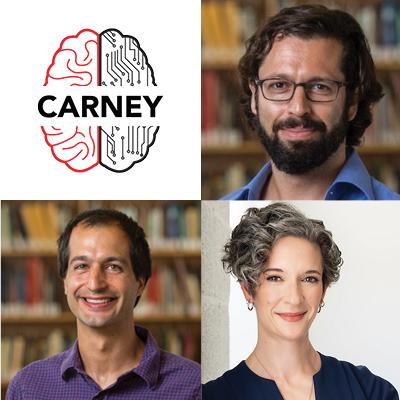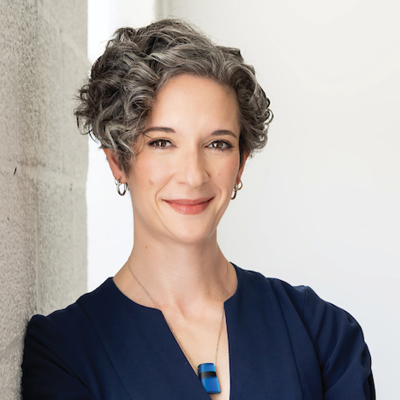Carney recognizes contributions of junior faculty with three 2023 Carney Institute Junior Faculty Excellence in Mentoring Awards

The Carney Institute has named Theresa Desrochers, Roman Feiman and Matthew Nassar as the three inaugural recipients of the Carney Institute Junior Faculty Excellence in Mentoring Awards. Established this year, these awards shine a light on outstanding research mentorship by junior faculty members.
“Mentorship is an important and also sometimes overlooked aspect of leading a lab and conducting scientific research,” said Diane Lipscombe, the Reliance Dhirubhai Ambani Director of the Carney Institute. “Junior faculty members can relate most closely to the trainee experience and their mentorship of the next generation of brain scientists is uniquely valuable. We are thrilled to recognize professors Desrochers, Feiman and Nassar as deeply insightful mentors, inspiring teachers and great scientists. By ensuring our trainees have the best start possible as they embark on their scientific journeys, these junior faculty exemplify what it means to give back to the brain science community.”
The Carney Executive Committee evaluated a pool of junior faculty members who were nominated this winter for their mentorship of undergraduate, graduate, or postdoctoral scientists, as well as medical students or residents.
Below are profiles of the awardees.
 Theresa Desrochers is the Rosenberg Family Assistant Professor of Brain Science, an assistant professor of neuroscience, and an assistant professor of psychiatry and human behavior. Her lab seeks to understand how the brain represents and organizes cognitive and behavioral sequences through research that combines animal and human experimental models. Since starting her lab in 2016, she has mentored students in neuroscience, engineering, and cognitive, linguistics and psychological sciences. Of her mentorship, her faculty nominator wrote, “She is patient, understanding and dedicated to going the extra mile for mentees, while maintaining the highest standards in scientific achievement.”
Theresa Desrochers is the Rosenberg Family Assistant Professor of Brain Science, an assistant professor of neuroscience, and an assistant professor of psychiatry and human behavior. Her lab seeks to understand how the brain represents and organizes cognitive and behavioral sequences through research that combines animal and human experimental models. Since starting her lab in 2016, she has mentored students in neuroscience, engineering, and cognitive, linguistics and psychological sciences. Of her mentorship, her faculty nominator wrote, “She is patient, understanding and dedicated to going the extra mile for mentees, while maintaining the highest standards in scientific achievement.”
“Professor Desrochers has supported me in every aspect of my graduate career, from helping me troubleshoot code to giving career advice. Without her, I would absolutely not have progressed as far,” said Hannah Doyle, a Ph.D. student in neuroscience who works in the Desrochers lab. “Despite an extremely full schedule as a junior faculty member, Professor Desrochers takes time to understand her students and tailors her mentoring style to each individual’s needs. We — myself and other past and present lab members — are incredibly happy to know that she is receiving this award!”
 Roman Feiman is an assistant professor of cognitive, linguistic and psychological sciences (CLPS). The director of the Brown Language and Thought Lab, Feiman and his team study how language expresses and reflects thought in babies, children and adults. Since starting his lab in 2018, he has mentored students in CLPS and computer science. Of his mentorship, his colleague said, “Professor Feiman is intentional in his training, mixing apprenticeship in the lab with group learning and discussion, and various skill-building and development activities. He is careful to focus not only on his objectives for students, but also to talk to them about their goals and training needs.”
Roman Feiman is an assistant professor of cognitive, linguistic and psychological sciences (CLPS). The director of the Brown Language and Thought Lab, Feiman and his team study how language expresses and reflects thought in babies, children and adults. Since starting his lab in 2018, he has mentored students in CLPS and computer science. Of his mentorship, his colleague said, “Professor Feiman is intentional in his training, mixing apprenticeship in the lab with group learning and discussion, and various skill-building and development activities. He is careful to focus not only on his objectives for students, but also to talk to them about their goals and training needs.”
“Professor Feiman strikes the right balance between providing structured support and intellectual freedom,” said Annika McDermott-Hinman, a Ph.D. student in cognitive, linguistic and psychological sciences who works in the Language and Thought Lab. “One of my favorite things that happens in our meetings is some version of this conversation: I will say, ‘Actually, I don't agree with that,’ and Professor Feiman will say, ‘Oh good, convince me.’ The goal is not for anyone to win the conversation or have the best idea, but just to get to the truth, and even as we argue about specific points we are actually collaborating on that goal together.”
 Matt Nassar is an assistant professor of neuroscience. As principal investigator of the Learning, Memory & Decision Lab, which he started in 2019, Nassar and his team use computational models to study how the brain processes information to facilitate intelligent behavior and effective decision-making in complex and dynamic environments. Of his mentorship, his faculty nominator said, “What sets Professor Nassar apart is his ability to mentor brain scientists at all levels, both formally and informally, from computational bootcamp for early undergrads to advising advanced postdocs, and in very different research aspects of brain science.”
Matt Nassar is an assistant professor of neuroscience. As principal investigator of the Learning, Memory & Decision Lab, which he started in 2019, Nassar and his team use computational models to study how the brain processes information to facilitate intelligent behavior and effective decision-making in complex and dynamic environments. Of his mentorship, his faculty nominator said, “What sets Professor Nassar apart is his ability to mentor brain scientists at all levels, both formally and informally, from computational bootcamp for early undergrads to advising advanced postdocs, and in very different research aspects of brain science.”
“Professor Nassar has a way of mentoring and collaborating that fosters a level of comfort that is rare among professors of his caliber,” said Abdullah P. Rashed Ahmed, a Ph.D. student in neuroscience who is collaborating with Professor Nassar on developing a novel human task. The pair have also put together a grant application that provides supplementary funding for trainees from underrepresented backgrounds. “You initially get the sense you are speaking with a fellow graduate student from how unassuming Professor Nassar is, until you realize the insights he provides are at the professorial level. Neuroscience and computational neuroscience have historically struggled with and continue to struggle with diversity. On this front, Professor Nassar has gone to great lengths to ensure that I—an African immigrant—have felt supported and have the resources to succeed in this phase of my Ph.D.”
In addition to the award, recipients will receive $2,000 for research or professional development activities.
Applications for the 2024 Carney Institute Junior Faculty Excellence in Mentoring Awards will open January 2024.



